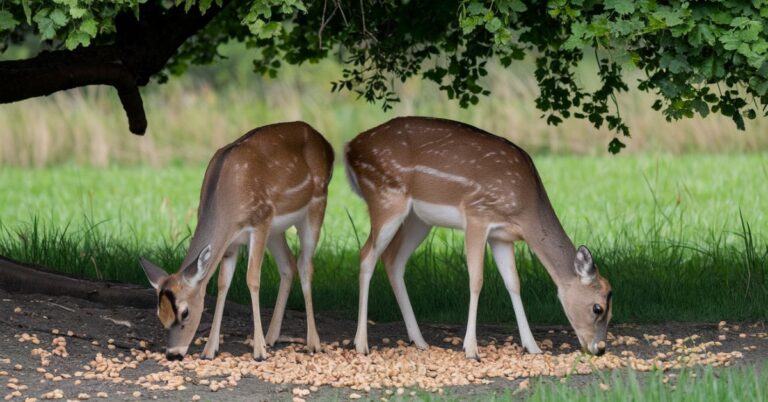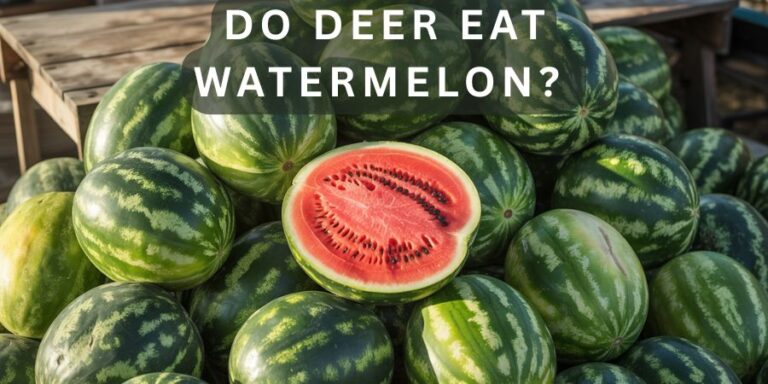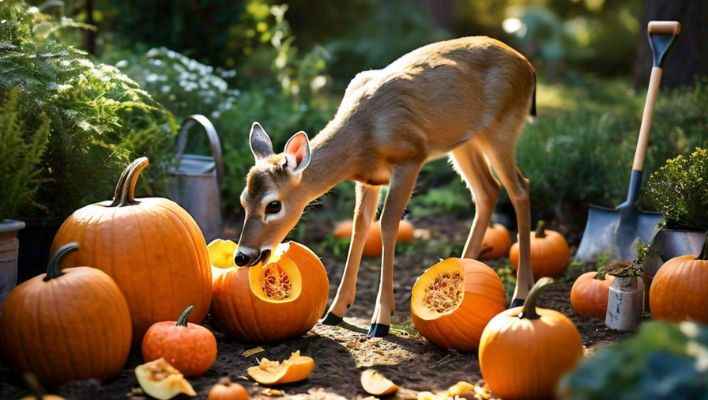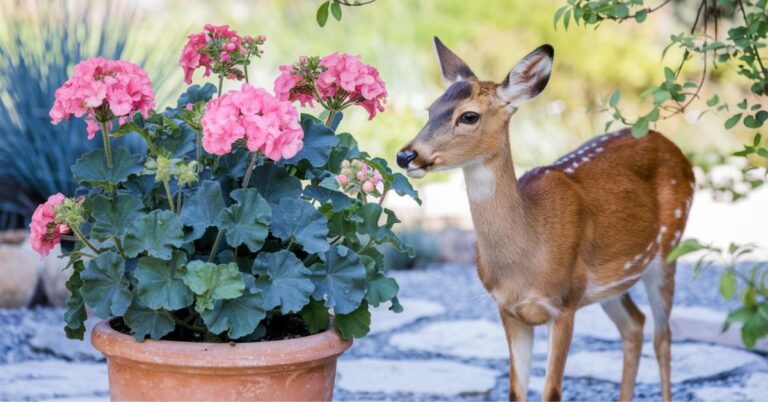Do deer eat roses? How to Keep Deer Away: 11 Garden Tips
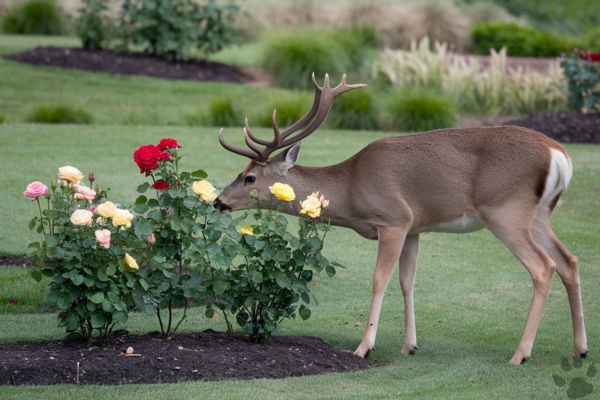
If you are a gardener with various rosebushes in your garden, you’ve likely faced an unwelcome guest like a deer at some point.
No doubt we love our roses and plants, but as a gardener, you need to know that deer love roses even more than we do, which can be heartbreaking.
Deer are beautiful animals, but they are also persistent creatures that can destroy your rose garden at any time, thinking it’s their food.
Do deer eat roses? The answer is yes! Deer eat both the flowers and the bushes, focusing on tender shoots and leaves and often leaving the stems stripped. Also, deer will munch on rose plants too, not just the roses themselves.
Deer can severely damage the health of the rose plant, including the leaves, buds, and tender stems.
This deer behavior becomes more intense in the winter because when the weather is cold and snow falls, other food sources become scarce, causing deer to venture into gardens and damage your roses.
No need to panic! Let’s look at some easy solutions to keep your roses safe from deer. Want a deer-proof garden? Start today by implementing these easy steps.
I’ll share some steps you can take to protect your rose garden and keep it looking lush and green all season long.
Understanding Deer Behavior
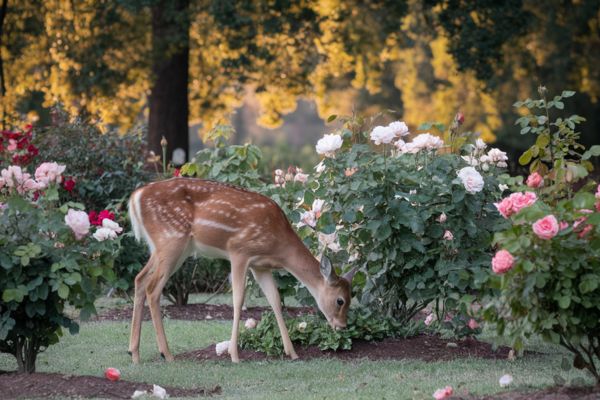
To keep deer away from our garden, we must first understand their behavior and the reasons why they prefer soft and fragrant flowers like roses.
Deer usually eat various foods such as leaves, flowers, and shrubs, and because of this habit, they are called herbivores.
During specific times of the year, they add fruits like apples, oranges, and even seasonal treats like watermelon and vegetables like carrots to their food.
Rose flowers are very soft and have a very attractive scent, which is why deer are attracted to them.
If a deer sees rose hips in your garden, it will surely attack them too. Rose hips are a fruit that forms after the flower blooms and contains many nutrients that attract deer.
Deer may attack rose hips more frequently during the fall and winter months when other food sources are scarce.
When deer face a food shortage, they may satisfy their hunger by eating Rose of Sharon plants. When deer cannot access other plants, they turn to these shrubs because they contain many colorful flowers.
Similarly, the soft leaves and large, colorful flowers of rose mallow attract deer. This plant is found in gardens and can be a prime target for deer in late summer and fall as food sources become depleted during these seasons.
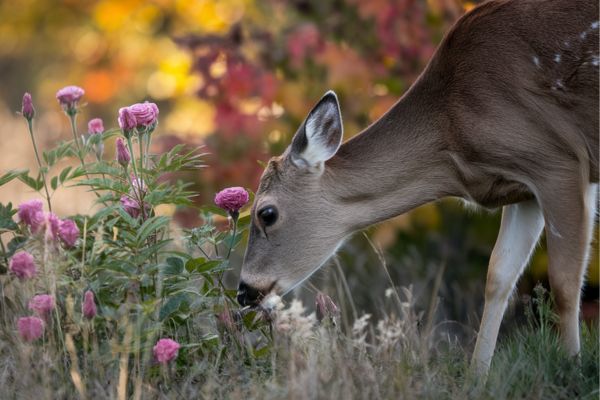
If you have roses and Rose of Sharon in your garden, you will need to take steps to protect them as soon as possible, as deer are not deterred from eating these plants.
Many people believe that the thorns on rosebushes are enough to keep deer away, but in reality, they are not.
If the thorns are large or sharp, they may slow the deer down a bit or cause minor discomfort, but a hungry deer will never back down from eating the bushes because of these thorns.
If food is limited, deer won’t hesitate to eat rosebushes, even with the thorns. Similarly, rose campion may appear to be a bad choice for deer because of its fuzzy leaves.
But despite this, deer also eat campion rose when other plants are scarce in late summer and fall. Rose bushes are a favorite of deer since the thorns don’t keep them away.
When food is not available, they can strip bushes of their leaves and buds, which can reduce the plant’s chances of recovery. In the forest life, it becomes very difficult to find natural plants during winter.
That’s why deer spend the winter feeding on woody plants, including rosebushes, and especially target the tender shoots and buds of rosebushes.
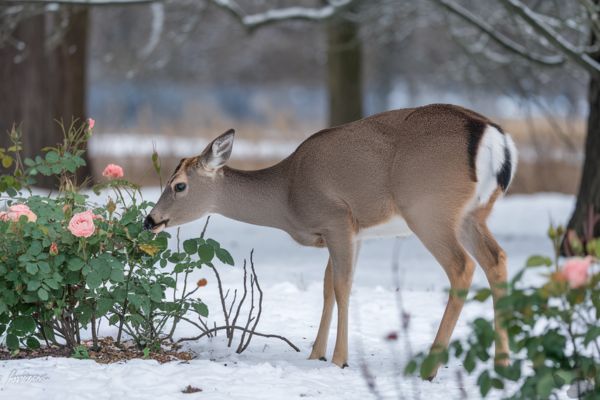
As summer ends and autumn approaches, deer tend to visit gardens more often because their natural food sources decrease during this time.
If there are ripe rose hips on your rosebushes, deer might come to eat them since they are a good source of vitamins and energy in winter.
Deer often go for these fruits, so your garden may lose both the flowers and the rose hips. When they visit gardens and find tender, young rose shoots and buds there, they are delighted because this is their favorite target.
When deer plan to attack your garden, they will choose the night. It is rare to see them eating roses during the day.
“”According to published information, a deer can eat about 5 to 15 pounds of plant material from shrubs and trees per day during the spring and summer seasons.“
During the colder months, deer may damage rose bushes as they depend on stored fat and search for food.
Do Deer Eat Roses? Why do deer eat roses?
To answer the question, do deer eat roses, it’s important to understand why these animals are attracted to them.
- Nutritional Value: The reason deer eat roses is not only because they are tender but also because they contain many nutrients, which is why deer are attracted to roses. In addition, roses have a high water content, which provides refreshment to deer in dry weather. The sugars in roses provide deer with instant energy, and the soft leaves of roses attract deer.
- Fragrant Flowers: Like humans, deer also love the scent of roses, and this may be a major reason why deer are attracted to roses. In the spring, deer often face a shortage of food, and during this season, the scent of many roses becomes very strong and sweet, which deer can smell from miles away.
- Palatability and Texture: When it comes to deer preferences, deer like young and tender shoots because they are easy to eat and digest. Deer like to eat roses that have thin leaves because of their texture.
Signs of Deer Activity in Your Garden
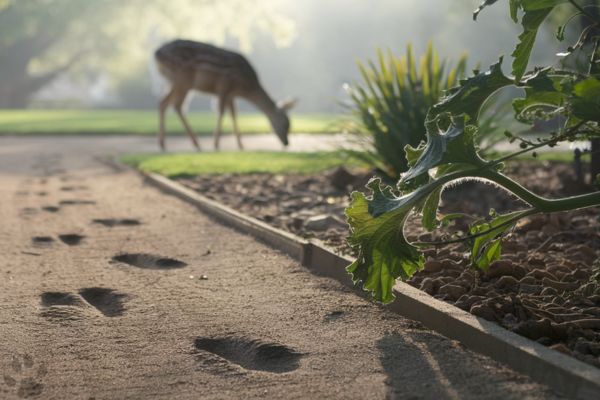
One way to determine do deer eat roses in your garden is by identifying the following signs of their activity.
- Physical Evidence: Look for deer footprints around your garden’s border. You can easily identify deer tracks because they are 3 to 4 inches long and have a split between the hoofs. Deer droppings can be found near the damaged plants, and they are small and pellet-shaped.
- Chewed Plant Stems and Leaves: Deer have a habit of grazing in a certain pattern. When the leaves and stems of your plants have rough, irregular edges, especially at the lower parts, it’s a sign that deer are nibbling on them. The edges of leaves can appear shiny after deer bite them with their teeth.
- Behavioral Signs: You should watch your garden early in the morning and late in the evening when deer are more active. Deer are out mostly in the morning and evening, so keep an eye on your garden during these parts of the day.
What Are the Best Tips to Keep Deer from Eating Roses?
If your house is in an area where deer frequently come and go, this could be a problem because they may attack your garden at any time.
If you’re tired of the same old routine — deer munching away at your garden — here’s how you can stop them.
Plant deer-resistant roses
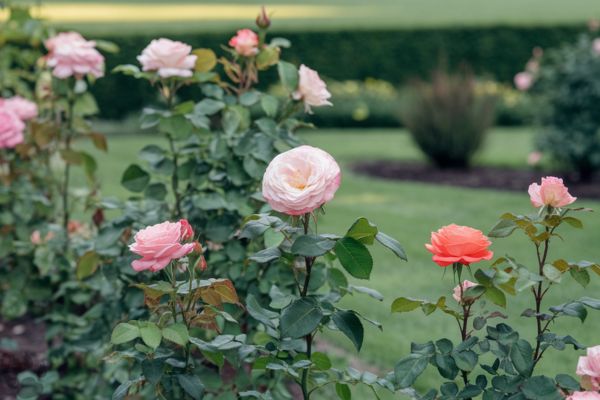
Just as humans love roses, deer also love roses, but there are some types of roses that deer do not prefer.
| Types of Roses Deer Avoid | Types of Roses Deer Like | Preferred Deer-Resistant Rose Varieties |
|---|---|---|
| Drift Roses | Old Garden Roses | Pasture Roses |
| Knockout Roses | English Roses (David Austin Roses) | Virginia Roses |
| Miniature Roses | Climbing Roses | Swamp Roses |
| Hybrid Tea Roses | Shrub Roses | Rugosa Roses |
| David Austin Shrubs | Hybrid Perpetual Roses | Explorer Roses |
Planting deer-resistant varieties in your garden will protect not only the flowers but also the rose plants themselves, as deer dislike these plants.
Invest in repellents
Deer repellent can also be a great option to keep deer out of your garden.
Switching between two or three repellents is a good idea to prevent deer from becoming familiar with them.
Keep an eye on these repellents and replace them over time, especially when it rains. Use repellents consistently during the growing season and reapply after rain or watering to maintain their effect.
Pay more attention to the outer edges of the garden, as deer are more likely to approach here. If you use repellents in combination, it can give you the best results.
For example, using a mixture of predator urine (like a coyote or wolf urine) along with a scent-based repellent (like garlic or hot pepper) will target both deer’s sense of smell and their natural instincts to avoid predators.
Add a protective fence
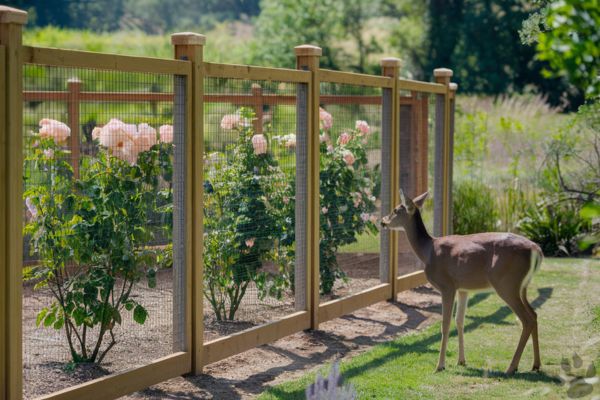
Another great way to keep deer away from your rosebushes is to install a fence. However, it is important to keep your mind alert when installing a fence because jumping over a fence is not a difficult task for deer.
For example, if you put a 4- to 5-foot high fence around your garden and think deer won’t be able to enter, you’re mistaken because deer can easily jump a fence of that height.
Before planting a fence, keep in mind that deer can easily climb fences less than 8 feet high. Pay attention to the height as well as the angle.
A fence that tilts outward can help keep deer from jumping over. Consider using slanted fences or regular fences that are around 8 feet high.
Along with the height of the fence and the angle at which it is installed, the type of fence material is also very important.
For example, a solid wood fence may work better than a wire fence because deer are less likely to cross a solid barrier. Also, if you don’t want to spoil the look of your garden, you should choose an electric fence.
You can keep deer away by using parallel fences that are 4 to 5 feet high with 4 feet of space between them.
I’m suggesting you install a parallel fence because deer can’t jump over them because they don’t know what’s on the other side of the parallel fence.
Use protective deterrents
Technical deterrents are also a good option. You can use them to keep deer away from your garden. When these deterrents sense movement, they make noise or spray water.
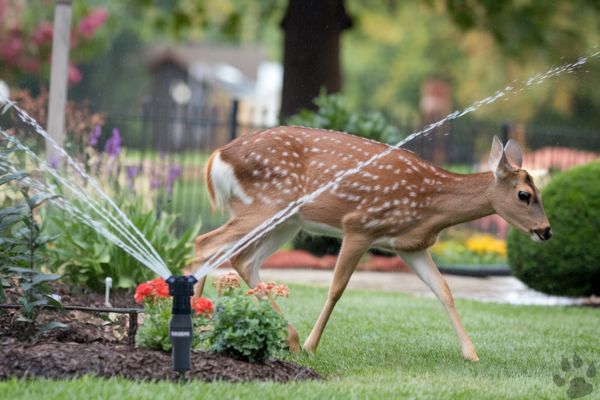
However, if you think these deterrents will keep deer away long-term, you’re mistaken because deer may become familiar with them over time.
Using Commercial Deer Deterrents
If your home is in an area frequently visited by deer, take steps as soon as possible to protect your rose garden.
Although many deer deterrents are available on the market, the taste and smell of deer sprays are unpleasant, and spraying them around your garden can effectively deter deer.
Start using this spray in spring and continue applying it weekly around your garden until September.
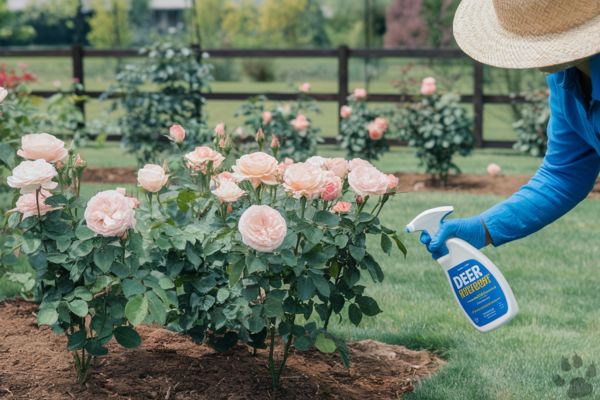
Mechanical Deer Proof Methods
Some mechanical methods can be effective in keeping deer away from your rose garden.
If you hang motion-activated sprinklers and noisemakers on trees in your garden, deer will stay away from your garden. You can also consider installing an electric fence.
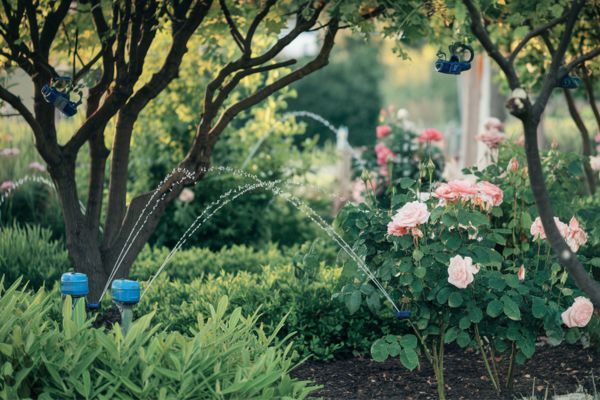
DIY Deer Proofing Tricks
If you don’t like any of the tips mentioned above, you can still use the DIY approach, in which you have to prepare deer repellent at home using a few ingredients.
Mixing water, garlic, and hot peppers can make a great mixture that can be effective. Spray this mixture on the roses in your garden every couple of weeks, and if there is heavy rain, spray it again after the weather clears.
Several DIY tricks might help. There are also some other DIY tricks you can use to keep deer away from your roses, such as using dog or human hair, dryer sheets, soap, or homemade sprays.
However, if you use the same trick every day, the deer will easily understand it, so try to use a new trick every day.
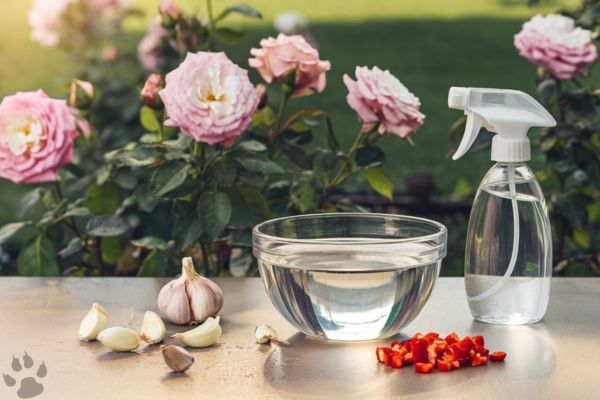
Planting Deer-Resistant Plants
If you want to get rid of this problem for life, you should plant deer-resistant plants or herbs around your rose bushes. There are many herbs and plants that deer are sensitive to in terms of smell, taste, and smell.
These herbs and plants include rosemary, sage, bee balm, lavender, basil, oregano, and chives. Some other plants that deer don’t usually eat are Bleeding Hearts, Astilbe, Marigolds, Butterfly Bush, and Coreopsis.
Netting
Netting is a cost-effective solution for keeping deer out of your garden. When choosing a netting material, first check its durability and then choose UV-resistant, heavy-duty polypropylene or nylon to withstand harsh weather conditions.
Install the netting properly. Use strong stakes to hold the net and secure it properly to stop deer from getting underneath. It’s best to use netting that deer can see but doesn’t ruin the look of the garden.
Sometimes, nets can become weak or break due to weather, so keep them maintained from time to time. It is up to you to decide whether you want to use temporary or permanent netting.
You can collect and store temporary netting at any time, while permanent netting protects your garden all year round.
There are different prices for netting, ranging from cheap to costly. This plan makes sure your garden is secure and keeps in mind things like how visible it is, how easy it is to maintain, and the cost.
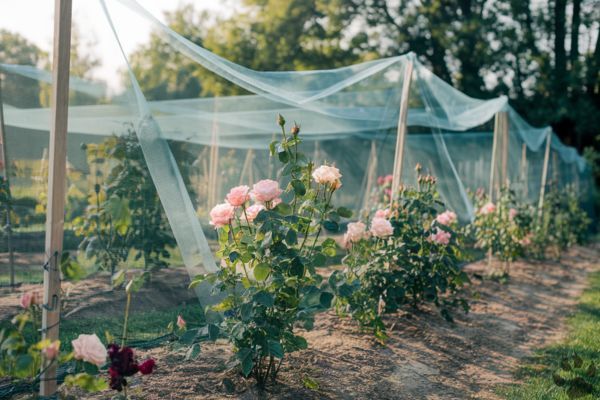
Garden Maintenance
If you take good care of your roses and keep trimming them daily, it will not only lead to their healthy growth but will also make it difficult for the deer to reach the tender new growth.
If the rose plants in your garden have spread too much, trim them so that deer do not have any opportunity to enter your garden.
Gardeners who are thinking about growing rose campion alongside traditional rose bushes should know that regular pruning and maintenance of rose campion is essential.
If you don’t keep the area around your rose campion clean, it can attract deer to your rose campion, so keep your entire garden clean.
Additionally, remove fallen leaves and other trash from the garden immediately, as these items can attract deer to your garden.
Keeping rose mallow and regular rosebushes healthy and using netting can lower the risk of deer damaging these plants.
When you keep your garden perfectly clean, there is a much lower chance that deer will visit your garden in search of food.
Noise Deterrents
Deer are very cautious animals and avoid going to areas where there are strange sounds. Noise deterrents can play an important role in keeping your garden safe from deer.
You can use windchimes, aluminum foil strips, or a radio to create sounds that will deter deer from visiting your garden.
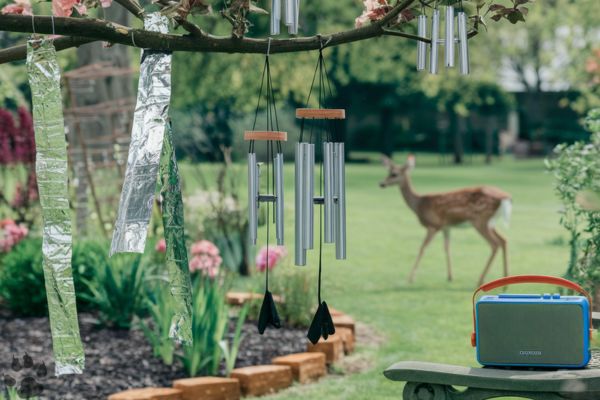
When the wind blows, metal or bamboo windchimes produce different tones, making them both practical and decorative. Foil strips create noise and reflect light, making it harder for deer to feel safe in your garden.
You can use radios or Bluetooth speakers to play voices from talk shows or podcasts to keep deer away by making them think someone is nearby.
If you have a large property, using an automated system can keep deer away from playing noises like predatory calls or human voices from time to time.
You can try using noisemakers that turn on when deer come near. When motion is detected, these devices make noises such as barking or alarms to scare deer and stop them from entering.
Using tin cans or bottles with pebbles is an easy way to make noise that can help keep deer away. Move and change the noise sources frequently so the deer don’t become familiar with them.
Using both noise and visual distractions, such as foil strips or netting, can help protect your garden from deer. Keep noise levels low to prevent disturbing neighbors and keep your garden safe from deer.
Organic Deer Repellent Recipe
If none of the options above suit you, we also share some organic deer-repellent recipes that can help keep deer away from your garden. Add the following ingredients to a blender and blend them.
- Add a cup of water
- Add three eggs.
- Add 1/3 cup hot sauce, for example, Tabasco.
- One-third cup of soap (used for washing dishes).
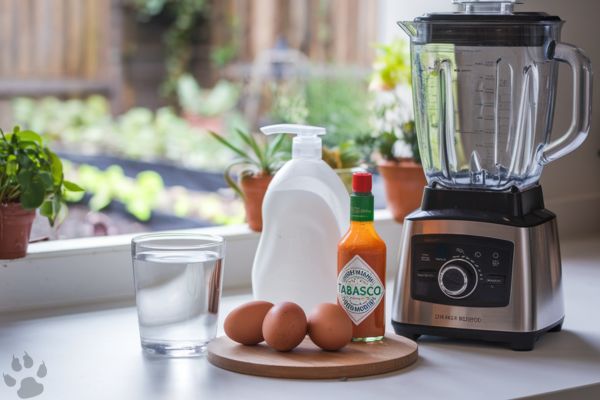
Now, put the mixture you have prepared in a spray bottle and spray it thoroughly in and around your garden once a week.
Deer hates beef bullion. If you add a cube of beef bullion to the mixture, it can also be beneficial, but it is usually unnecessary.
While making this mixture, you may wonder whether it’s harmful to your roses or other plants. The simple answer is no.
It will not harm the roses and other plants in your garden. However, one thing you have to keep in mind is that you must use protective gloves and goggles when you are making this mixture.
What are deer-resistant plants?
As I have told you before, you can keep deer away from your garden by planting deer-resistant plants. Now let’s learn the names of the plants that you can plant in your garden to keep deer away.
- American Holly – Deer doesn’t like it because of its scratchy leaves.
- Bee Balm (Monarda) – Deer doesn’t like its strong smell.
- Blue Spruce – The sharp needles naturally stop animals from getting close.
- Catmint – Deer avoids the smell of mint.
- Columbine (Aquilegia) – Deer don’t often go near its delicate flowers.
- Coneflower (Echinacea) – Deer stays away because of the rough texture and strong smell.
- False Indigo – Deer avoids it because it tastes bitter.
- Fern-Leaved Bleeding Heart – Deer usually stays away from its fern-shaped leaves.
- Foxglove (Digitalis) – It is toxic to deer, so it helps keep them away.
- Hardy Geranium – Its strong scent is a deterrent.
- Japanese Anemone – Deer dislikes its texture and taste.
- Lamium – Its hairy leaves and strong scent repel deer.
- Lilac – The strong scent is not appealing to deer.
- Lungwort – The hairy leaves make it unattractive to deer.
- Most Ferns – Their texture and lack of appeal make them deer-resistant.
- Ornamental Onion – The onion-like scent deters deer effectively.
- Russian Sage – Its strong scent and rough texture are disliked by deer.
- Salvia – Its aromatic foliage helps keep deer away.
- Spike Speedwell – Deer avoids its upright, spiky growth habit.
- Threadleaf Coreopsis – Its fine, thread-like foliage is typically ignored by deer.
How to Recover Roses from Deer Damage?
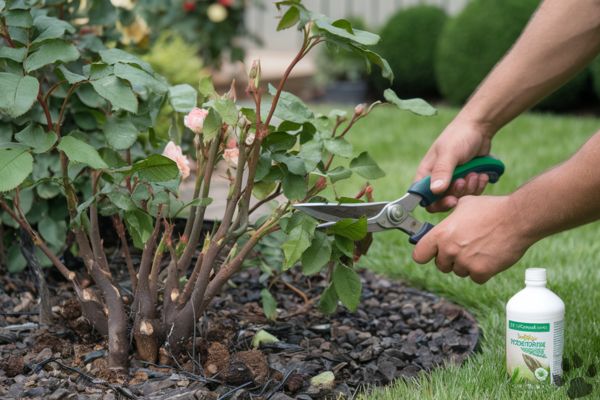
- Prune Damaged Parts: First, remove any broken stems or canes that have been broken by deer. Cut away the damaged wood and leave only the healthy section. This helps the plant use its energy to grow healthier new leaves and stems.
- Apply Natural Fungicide: After cutting, use a natural fungicide on the trimmed parts to stop diseases. This step helps protect the plant from infections that may cause more damage.
- Water and Fertilize Lightly: Keep the roses hydrated by watering them deeply during dry and hot periods. Apply a small amount of balanced fertilizer with low nitrogen to help the plant grow back.
Do Deer Eat Roses, and Will They Grow Back?
There is no doubt that roses are often attacked by deer, but after enduring all this, they recover very quickly.
Along with removing the damaged canes, inspect the shrub for broken stems or infections that might affect its recovery.
If deer eat your roses—thorns—the bushes can still grow back if you take good care of them. The thorns may help reduce some damage, but they aren’t enough to stop deer from eating the plants.
Deer will eat whatever part of the plant they can reach, often leaving just the bare stems. It is very rare for deer to eat the roots or bark.
If this happens, some types of roses take a long time to recover; however, this is very rare.
After trimming the rose, you can put some organic mulch around the base to help the soil stay moist and keep its temperature steady. This can lead to better regrowth.
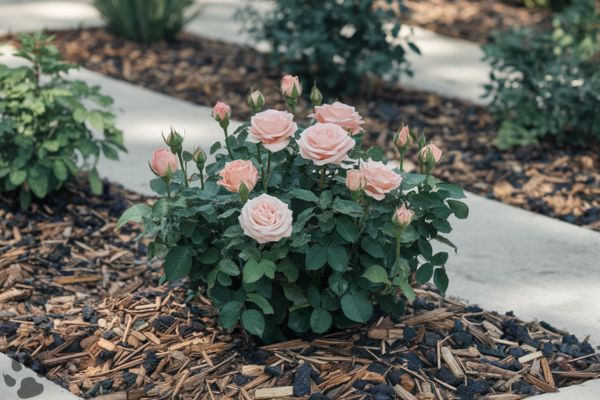
Water the plant only as needed, because too much water can cause stress. Wait for the rose to recover, and when you see new growth, add a slow-release, balanced fertilizer if needed.
Once your roses have recovered, you should take extra care of them. For example, put up a fence around your garden and use netting.
Using these methods, you can prevent deer from entering your garden and restore your roses to their original condition.
Sometimes it happens that when we take good care of roses, they return to their former beauty, but if the deer has caused a lot of damage to the flowers, they take some time to recover.
Conclusion
In conclusion, deer-eating roses can cause trouble for gardeners because they feed on both the flowers and the tender shoots of the plants.
Deer may be attracted to rose hips, leaves, and buds, but you can protect your garden.
Planting deer-resistant plants like lavender or marigolds around your roses can help keep deer away, as they usually avoid these plants.
You can also use repellents, put up deer-proof fences, or add netting to help keep deer away from your roses.
If you are tired of deer coming into your garden every day, you should also use protective measures such as noise deterrents or DIY sprays.
By taking these steps, you can protect your rosebushes from deer and relax knowing your plants are safe.
These strategies will help you in every way, whether you want to prevent deer from eating your rose bushes or create a deer-proof garden. By following these strategies, you can maintain a healthy and beautiful garden.
FAQ’s
How do you keep deer from eating your roses?
If you want to prevent deer from eating your roses, you should use some deer repellent, such as electric fencing or woven wire. Cover weak plants, especially young or tender plants, with netting or garden fabric. Use some commercial repellents that deer dislike, such as egg yolk, garlic, or hot peppers.
What flowers do deer eat the most?
When deer invade your garden, they first start eating their favorite flowers and plants, such as (hosta, daylilies, tulips, eastern arborvitae, azaleas, young yews, roses, and rhododendrons)
Do deers eat knock-out roses?
Roses are not safe from deer. When deer are hungry, they do not choose what they like or dislike but eat whatever is in front of them. Relax, Knock Out® Roses are tough and durable. Knockout roses bloom several times a season, so you get to see new roses very quickly.
What plant attracts deer the most?
Soybean plants are very important in this conversation. Alfalfa and perennial clover are also mentioned in this discussion because they have the ability to provide deer with fodder almost year-round, except during the winter season. However, some land managers keep corn at the forefront of this conversation.
What happens if deer eat roses?
Deer usually target the tender parts of roses and newly growing plants, even if they have thorns. It is very dangerous for rose bushes, buds, stems, and leaves. Mature roses recover quickly, but you can also help other flowers recover by taking regular care of them. Some rose types, such as Rugosas and Harison’s Yellow, are less likely to be damaged by deer.
Who is most likely to eat roses: deer or other animals?
Deer are best known for their herbivorous diet, eating rose plants, rosebuds, and new shoots. However, when faced with a food shortage, some other animals such as rabbits, squirrels, goats, elk, gophers, and voles may also attack roses.
What plants do deer prefer over roses?
There are some plants that deer will prefer to eat if they are present with roses, such as hostas, yews, azaleas, and fruit trees. Roses are not a top priority for deer, except during times of food shortage. Deer can destroy the entire rose plant, except for the rose stems.
How do deer find roses to eat?
Deer have a very keen sense of smell, which allows them to easily reach roses. However, you can prevent deer from entering the garden by planting a fence. You can also use deer repellents or other plants that deer dislike.


